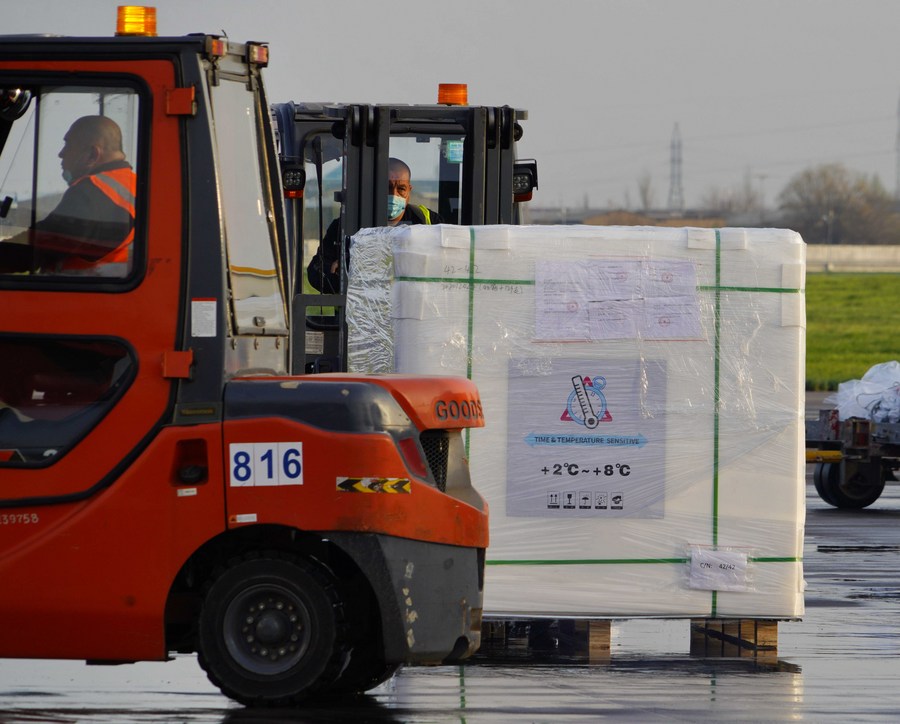China, Central Asia to strengthen cooperation in various fields: Chinese FM

A freight train from Rizhao to Central Asia leaves a container station of Rizhao port in east China's Shandong Province, Sept. 12, 2017. The train, loaded with containers of automobile components, numerical control machines, plastic productions and daily necessities, leaves China through the port in Horgos and passes Kazakhstan, Uzbekistan, Kyrgyzstan, Tajikistan and Turkmenistan. (Xinhua/Guo Xulei)
A stable and prosperous Central Asia serves the common interests of countries in the region and is conducive to world peace and development, Chinese State Councilor and Foreign Minister Wang Yi said, adding that China's foreign policy towards Central Asia is active, friendly, open and transparent.
DAMASCUS, July 18 (Xinhua) -- China is ready to work with Central Asian countries to make plans for further cooperation in various areas, Chinese State Councilor and Foreign Minister Wang Yi said on Friday.
Wang made the remarks during an interview after his visit to Turkmenistan, Tajikistan and Uzbekistan, as well as his attendance at the meeting of the Shanghai Cooperation Organization (SCO) Council of Foreign Ministers and other multilateral meetings.
China will work with Central Asian countries to deepen mutual trust, strengthen mutually beneficial cooperation, and give full play to the role of the new platform of the "China + Central Asia" to help Central Asian countries accelerate their development, he said.
A stable and prosperous Central Asia serves the common interests of countries in the region and is conducive to world peace and development, Wang said, adding that China's foreign policy towards Central Asia is active, friendly, open and transparent.

A staff member unloads cherries imported from Kyrgyzstan at the Diwopu International Airport in Urumqi, northwest China's Xinjiang Uygur Autonomous Region, June 12, 2019. (Xinhua/Wu Yue)
When talking about the results of the meeting of the SCO Council of Foreign Ministers, Wang said that all parties reached a series of consensus on the work plan of the SCO and major international and regional issues.
All parties agreed to make solid preparations for the summit to be held in September this year and made full political preparations for the summit's results, Wang said, adding that the parties pledged to stick to the Shanghai Spirit.
They agreed to expand regional cooperation, tap the potential of cooperation, expand cooperation areas, promote vaccine cooperation to fight the epidemic, and accelerate the economic recovery and improve people's livelihood.
All parties believed that it is necessary to maintain an international system with the United Nations at its core, an international order based on international law, and a clear-cut stand against unilateralism and hegemony in any form, Wang noted.

Chinese technicians pose for a photo with Uzbek drivers on an electric locomotive in Tashkent, Uzbekistan, Dec. 17, 2020. (Photo by Zafar Khalilov/Xinhua)
Since the outbreak of the COVID-19 epidemic, China and Central Asian countries have supported each other and carried out fruitful cooperation, he said.
The Chinese government has fulfilled its solemn commitment to making vaccines a global public good, and has provided assistance and exported several batches of Chinese vaccines to Central Asian countries, he added.
China will work with Central Asian countries to build a China-Central Asia health community, he noted.
On the basis of expanded vaccine aid and exports, China will promote cooperation in the vaccine industry based on technology research and development, trade in manufactured goods and joint production, so as to forge a comprehensive vaccine partnership, Wang said.
China will strengthen the public health system, expand cooperation between sectors of modern and traditional medicine, and ensure traditional medical centers are fully available in Central Asia, he said.
Although the pandemic has dealt a severe blow to the world since last year, the cooperation between China and Central Asian countries under the Belt and Road Initiative has never stopped, and instead shown great resilience and vitality, Wang said.
He noted that China aims to forge a closer partnership with Central Asian countries in healthcare, digitalization, "green" development and connectivity.
As for China-Turkmenistan relations, Wang said the two countries will negotiate and sign documents on cooperation under the Belt and Road Initiative as soon as possible, and comprehensively align the China-proposed Belt and Road Initiative with Turkmenistan's development strategy to revive the Great Silk Road, so as to open up new opportunities for further cooperation.
He said China and Turkmenistan will formulate a five-year plan for bilateral cooperation, strive for strategic partnership across the whole industrial chain of the energy sector, and expand cooperation in non-natural resources sectors, healthcare, including COVID-19 vaccines, biosecurity, information security and cybersecurity.
Commenting on the prospect of China-Tajikistan ties, Wang said the two sides need to not only build a community of common development and a community of common security, but also work for a community of common health and push forward the building of a community of a shared future for mankind, so as to raise the bilateral cooperation to a new level.
To that end, China and Tajikistan need to jointly seek development and cooperation, erect a safety barrier, and battle the COVID-19 epidemic.

Workers transfer COVID-19 vaccines at Tashkent International Airport in Tashkent, Uzbekistan, on March 27, 2021. (Photo by Zafar Khalilov/Xinhua)
As Uzbekistan is advocating reform and opening-up at full scale, Wang said China will continue to support Uzbekistan in the pursuit of reform and opening-up.
To build a more dynamic China-Uzbekistan partnership that entails a richer context and provides more benefits to the two peoples, the two sides need to further consolidate political mutual trust, deepen mutually beneficial cooperation and strengthen strategic coordination, Wang said.
Talking about the situation in Afghanistan, Wang said that this year marks the 20th anniversary of the U.S. war in Afghanistan, but peace has not come, and the flames of war have started again.
China always respects the sovereignty, independence and territorial integrity of Afghanistan and adheres to the norms governing international relations of non-interference in Afghanistan's internal affairs, Wang said.
He added that China hopes that Afghanistan will have a resurrection, build a broad and inclusive political framework, resolutely fight terrorism in all its forms, and seek friendly coexistence with all its neighbors.
Photos
Related Stories
- China proposes four-point solution to Syrian issue: FM
- China opposes any attempt to seek regime change in Syria: FM
- China to strengthen cooperation with Bangladesh in beating pandemic, alleviating poverty: FM
- China stands ready to enhance cooperation with Belarus: Chinese FM
- Chinese, Pakistani FMs exchange views on serious Chinese casualties in Pakistan
Copyright © 2021 People's Daily Online. All Rights Reserved.










